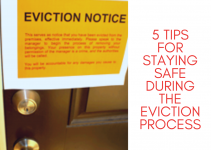Are you a landlord who is looking for more information on Portland Oregon evictions? If so, you’ve come to the right place.
In this article we will break down the eviction process for the PDX area and provide you with some tips on how to navigate the complex process of eviction in Portland, OR.
Eviction For Month-To-Month Tenants
Do you have a month-to-month tenant living in your Portland rental property? If so, even though they are on a month-to-month lease, the law states that you must provide your tenant with a 30-day notice.
In some cases it’s possible to evict your month-to-month tenant sooner than 30 days but this is usually reserved for tenants who engage in “extreme” actions like drug dealing or if they haven’t paid their rent within 7 days.
A landlord in a month-to-month tenancy may also give you a 30-day eviction notice for cause. The cause for the notice must be either for not living up to your rental agreement or not complying with your duties set forth in the law. The notice must tell you the reason for eviction and must say that the rental agreement will end at least 30 days after you get the notice. If you can fix the problem by making repairs, paying damages, or otherwise, your landlord’s notice must also say that you can avoid eviction by fixing the problem within 14 days. The time period to fix the problem in a manufactured dwelling facility is the full 30 days. If you do not fix the problem within the 14 days, or 30 days if you are a homeowner renting space in a facility, your landlord may file a court eviction case after the 30-day notice period has gone by. If you do deal with the problem and your landlord is satisfied, your rental agreement will not end. However, if the same problem happens again within six months of the first notice, your landlord can end the rental agreement with a 10-day written notice that clearly states the problem and date of termination. In a facility, the second notice must provide 20 days for the tenant to move out.
In most kinds of housing, a landlord of a month-to-month tenancy may also attempt to evict you with a 72-hour notice for not paying your rent. This may happen if you have not paid rent within 7 days of its due date. If you receive this type of notice, it must state that your landlord intends to end your rental agreement if you do not pay the rent within 72 hours. If you do not pay the rent within the 72 hours, your landlord may immediately file a court eviction proceeding. In calculating the 7-day period, the day the rent is due counts. For example, if your rent is due on the first of the month, your landlord may give you a 72-hour notice on the eighth of the month. Your landlord may not evict you in 72 hours for non-payment of rent when the only money you owe is a late charge. In the alternative, your landlord can give you notice after four days that would give you 144 hours to pay the rent.
In a month-to-month rental agreement, your landlord can also issue a 24-hour written notice to end your tenancy under very limited circumstances. The law specifies the reasons. You may receive a 24-hour eviction notice if you have intentionally injured someone other than a member of your household, intentionally damaged the property, or committed an act that is “outrageous in the extreme.” An outrageous-in-the-extreme act is not specifically defined by law, but does include prostitution or promotion of prostitution, violence, manufacture or delivery of drugs, intimidation and burglary. A landlord may not use a 24-hour notice or otherwise attempt to evict someone for being the victim of a crime such as domestic violence, stalking, or sexual assault, however. The landlord may give a 24-hour notice to any person living in a house where the tenant had a written rental agreement that prohibits sub-leasing. This is enforceable if the landlord has not taken rent from the person who is not covered by the rental agreement. A tenant who lied about criminal convictions on a rental application may, under limited conditions, get a 24-hour notice.
In housing operated by a housing authority or a nonprofit organization as “drug and alcohol free housing,” a tenant for less than two years who violates the drug or alcohol policy may be subject to a 48-hour notice with one day to correct the problem.
You may have a lease for a specific time — often six months or one year. This time period is called the term of a lease. The valid parts of your lease will determine when it can be terminated or renewed. During the term of your lease, neither you nor your landlord can terminate the lease without cause, unless your lease states otherwise. Your landlord may end the tenancy during the term for non-payment of rent, serious violations of the lease, or for intentional dangerous behavior as described before. Although your written lease agreement cannot shorten the number of days required by law for notices of termination, the lease may make notice periods longer. For example, a lease that allows the landlord to give you a 24-hour notice of non-payment of rent would not be permitted. However, you could hold your landlord to a lease that requires a 96-hour notice of non-payment. If a fixed-term lease contains nothing about its termination or renewal, the lease simply ends without notice from either party on the date stated in the lease. The lease could, however, contain a provision that turns the tenancy into a month-to-month tenancy at the expiration of its term lease. In that case, the tenancy would have to be terminated with a notice as discussed above. In that situation, the tenant would be expected to move at the end of the term without notice.
Just as the law establishes very specific requirements for eviction notices, it also requires that notices be served in very specific ways. Even if the notice is correct, it may have no effect if it is not served the right way.
Notices may be served by either personal delivery or by first class mail. A lease or other written rental agreement can outline additional ways to serve notices. First class mail is specifically defined. It does not include certified or registered mail or any other type of mail that may delay actual delivery of mail to the tenant. If your landlord chooses to serve a for-cause eviction notice by mail, you would get three extra days to correct the cause in the notice. The termination of the tenancy would also be extended by three days.
A 72-hour (or 144-hour) notice for not paying rent is considered to be served on the day it is both mailed to the tenant and attached securely to the main entrance of the tenant’s dwelling unit. The same is true for a 24-hour notice of termination for outrageous or dangerous behavior.
It is important to know that your landlord cannot evict you in retaliation for your having asked to have repairs done, or for asserting other legal rights under the rental agreement or the landlord-tenant laws.
Source – Oregon State Bar
Eviction For Fixed-Term Tenants
A landlord may terminate the tenancy during a fixed term (such as when the tenant has a lease or other written rental agreement for one year) only with cause and proper notice. (Ore. Rev. Stat. § 90.427(4)(a).) If the tenancy expires within the first year of occupancy, the landlord may terminate without cause by giving 30 days’ written notice. (Ore. Rev. Stat. § 90.427(4)(b).) If the tenancy terminates on a date after the first year of occupancy, the fixed-term tenancy becomes a month-to-month tenancy upon the expiration of the fixed term, unless the landlord and tenant agree to a new fixed-term tenancy, the tenant gives 30 days’ notice, or the landlord has cause to terminate and gives proper notice. (Ore. Rev. Stat. § 90.427(4)(c).)
Tenant Eviction Defenses
Even when a landlord has a valid reason to evict a tenant, the tenant might decide to challenge the eviction in court. The tenant could also have a valid legal defense, such as the landlord retaliating against the tenant or failing to maintain the premises of the rental unit. The tenant’s decision to fight the eviction could lead to increased costs of the lawsuit for both the landlord and the tenant and allow the tenant more time to remain living in the rental unit. If a court finds that a landlord unlawfully removes or excludes a tenant from a rental, the tenant might be able to recover possession or recover the greater of up to two month’s rent or twice the tenant’s actual damages. (Ore. Rev. Stat. § 90.375.)
Removal of the Tenant
Even after a landlord wins an eviction lawsuit against a tenant, the landlord is not authorized to remove the tenant from the rental unit. Only a law enforcement officer with a court order can do that.
Tenants sometimes leave personal property behind at the rental unit after an eviction has occurred. If this happens, Oregon law requires the landlord to store the property in a safe location and then send a written notice to the tenant. This notice must inform the tenant of the property the tenant left behind and that the tenant has 30 days to claim the property. If the tenant does not claim the property within 30 days, then the landlord can dispose of it. The landlord can also charge the tenant for the costs of storing the property. (Ore. Rev. Stat. § 90.425.)
Rationale for the Rules
Landlords must carefully follow all the rules and procedures required by Oregon law when evicting a tenant; otherwise, the eviction may not be valid. Although these rules and procedures may seem burdensome to the landlord, they are there for a reason. Evictions often occur very quickly, and the end result is serious: the tenant has lost a place to live. The rules help ensure the eviction is justified and that the tenant has enough time to find a new home.
Contact Rent Portland Homes
At Rent Portland Homes, 99.9% of our homes are eviction free! If you need help with finding great tenants for your rental property, or you need eviction help, contact us today by clicking here






